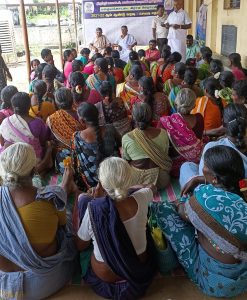In a first of its kind, government school Head Masters in Tamil Nadu raised the school issues in grama sabha meetings on October 2

Villagers and parents attended the gram sabha meeting in Playakottai in the Tirupur district. (Supplied)
For the first time in the history of Tamil Nadu, several government-school headmasters and members of the School Management Committee (SMC) took part in the gram sabha meetings to discuss the issues related to their respective schools.
This came following a direction in this regard from the state’s school education department.
A gram sabha is a governing institute in Indian villages constituted by local elected representatives.
In the grama sabha meetings that took place in the state on 2 October, on the occasion of Gandhi Jayanti, the headmasters — along with the parents, teachers, villagers, and local representatives — unanimously passed several resolutions adopted in the SMC.
While several headmasters saw this meeting as a turning point for the development of schools and improvement of the education system in the villages in the state, it was also said that the meetings would pave the way for local representatives to understand people’s aspirations from the grassroots.

Villagers listening to the discussion held during the gram sabha meeting in Palayakottai in the Tirupur district. (Supplied)
According to education rights activist Prince Gajendra Babu, the gram sabha meetings would help the local elected representatives understand the aspiration of the people.
“So far, the discussions about the development of the schools and other resolutions remained within the committee, and only a very few schools came into the limelight. However, with these gram sabha meetings, the headmasters are directly involved and they bring out the issues to the public, making it a community discussion.”
He said this would also help the representative take the issues to the concerned department within the government.
Claiming that the school education department was stuck in a vicious cycle, he also said the meetings would educate the representatives on the seriousness of the number of dropouts in government schools.
“The headmasters and others now have the opportunity to address the dropouts’ issues. Earlier it was between the parents and students, but now these representatives will also get a chance to know the seriousness of the issue and can contribute to stopping such incidents,” he told South First.
He also questioned the sincerity of the government officials in implementing the resolutions passed.
South First spoke to a few headmasters who attended such meetings, and found that the gram sabha meetings were a welcome change for them.
M Senthil, the headmaster of Maniyankuruchi Higher Secondary School in the Trichy district who attended one such meeting, told South First that through the gram sabha, he was able to discuss various students’ issues with their parents.
“Many students these days are addicted to drugs and other substances, because of which they are irregular in their classes. Their parents, who work to make a living, are unaware of such incidents and are sometimes unavailable to be approached. But, through this gram sabha, we spoke about such incidents and educated the parents about them, which I believe will help the education of every student,” he said.
Besides, resolutions to improve school infrastructure, additional playgrounds, toilet facilities, and appointment of teachers per class and per subject were also passed.
Kanagaraj, the headmaster of a government middle school in Marudurai in the Tirupur district, echoed similar sentiments when speaking to South First.
S. Murthy, a school teacher from Playakottai in the Tirupur district, told South First that the SMC lacked supervision and many issues discussed in it are not implemented, adding that the gram sabhas would be the pathway for the development of government schools in the state.
The gram sabha meetings also enlightened the parents and the villagers about the Right to Education.
Ramakrishnan, a 40-year-old daily wager in the Tirupur district, told South First that he learnt about the importance of sending his kids to schools and monitoring whether they were regular there.
“I’m a daily wager, and I have no time to look after the education of my two children. I believe my kids regularly attend their classes. However, after hearing the headmasters, teachers, and authorities talk about the implications of dropping out, I’m going to make sure my kids make use of their education,” he said.
“The meeting was also a medium that taught parents like me more about the importance of education,” he added.

May 11, 2024

May 11, 2024

May 11, 2024

May 10, 2024

May 10, 2024

May 10, 2024